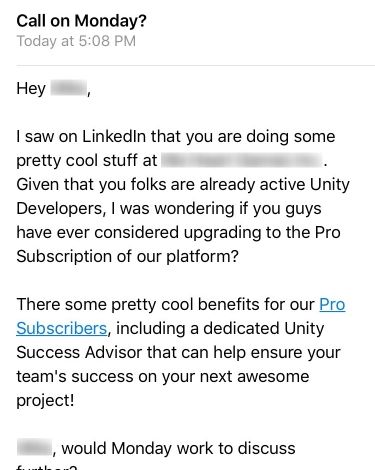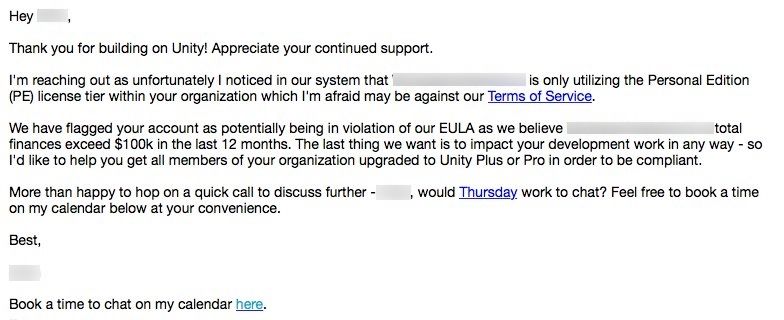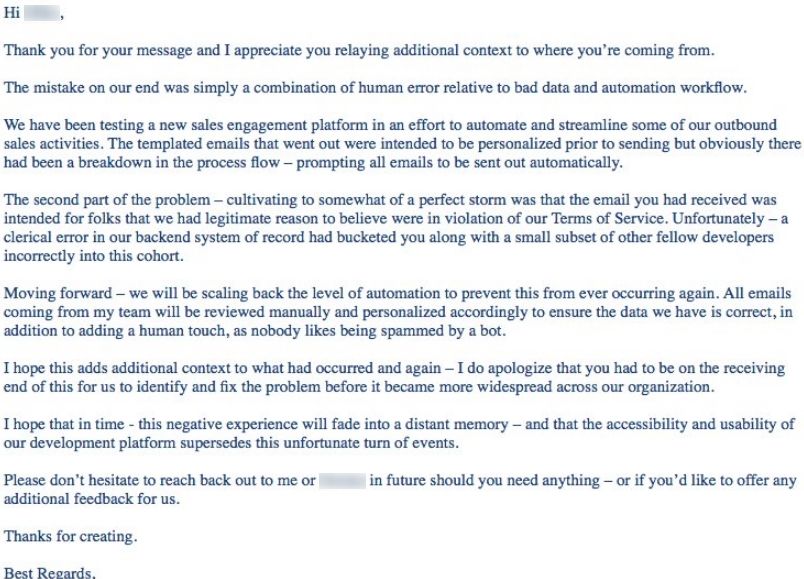Unity® software is one of the most popular options for beginning and established indie developers. With a great feature set and range of target platforms it’s a very attractive choice. The popularity of Unity® software is in no small part thanks to a very liberal free license tier which allows developers grossing less than $100k annual revenue to use the fully featured engine at no cost.
While it’s reasonable to expect that Unity Technologies would try to attract developers on the free tier to upgrade to a Unity Plus or Unity Pro license, it would seem some developers have been the subject of dishonest hard sale tactics and even some coercion.
We’ve spoken to several developers, and it seems there is a pattern to these aggressive sales tactics beginning with a message like the following:

Nothing is particularly amiss here. The message is polite, not overly pushy, and simply invites discussion of an upgrade. Unfortunately, however, it seems this “cold call” style message is a little dishonest. Several of the developers we have spoken to have received this message despite no mention of their project on LinkedIn, and at least two are not even registered on the platform.
The above message has then been followed up with a message suggesting developers are in violation of Unity® software licensing terms due to a higher revenue than the allowed $100k.

Now, these aren’t big-name developers with highly successful projects receiving the messages. Some trivial investigation of the developers’ social accounts or websites would reveal they have not earned anywhere close to the limit.
One developer Tweeted:
Quote“Okay @unity3d, I know you really want to sell me a subscription, but this is a new low. I haven’t even made 100k in my entire life let alone the last year.”
Mike Berg of We Heart Games (who kindly provided the above images) had the following to say:
Quote“After a string of aggressive — and even deceptive — emails from various folks at Unity, I got one yesterday filled with veiled threats, and accusations that I might be breaking the EULA by earning more than $100k per year.
This kind of open hostility toward hobbyist game developers is such a bad sales tactic, I don’t even know where to begin. People using the free license are exactly the people you should be treating with encouragement and respect. These are your future stars. The aggressive tactics by the sales team are so off-putting, that I no longer have any interest in doing business with Unity, and will now have a hard time recommending them to other game developers.
I understand that having an income limit in your EULA is something that needs to be enforced, but it would have taken someone 10 minutes of looking at my company’s online presence to see that I’m not making money making games. I have nothing on either App Store, nothing on Steam, and four tiny free games on itch that aren’t even finished. A company should have some strict guidelines about what makes a customer suspect of breaking the EULA, before they get an email like the one I received yesterday.
There are many good people at Unity. Unfortunately, this approach makes the entire company look bad.”
At the time of writing, Unity Technologies has not responded to our request for comments, but have been in contact with some of the affected developers. Mike Berg has kindly shared part of his exchange, which you can view in full on Twitter, and we have included part of here:

Hopefully, the follow up from Unity Technologies and reduction of automated processes prevents similar incidents from happening in future, though in at least some cases it seems it’s too late to win back customers who have received the messages and are now considering alternative options.
The Unity logo and Unity product names are the property of Unity Technologies.








